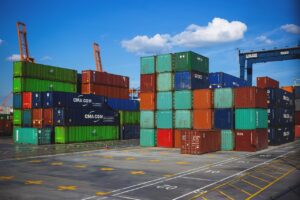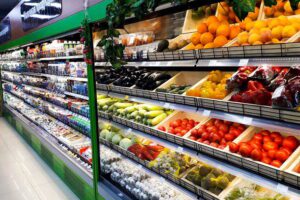
Canada, following the UK and the EU, is canceling all duties on imports of goods from Ukraine, Canadian Prime Minister Justin Trudeau announced after meeting with President Volodymyr Zelensky in Kyiv on Sunday.
“This is a good continuation of the initiative of the EU and Britain, which confirms the interest of developed countries to involve the Ukrainian economy in their own industrial and trade chains,” Yulia Sviridenko, First Deputy Prime Minister and Minister of Economy, commented on this decision.
She recalled that on the eve of this meeting, she also discussed with Canadian Minister of International Trade Mary Angie the whole range of economic cooperation measures that both countries intend to implement.
“For our ministry and Ambassador to Canada Yulia Kovaliv, this is an ambitious work program for this year,” Sviridenko stressed.

A situation at the customs has somewhat improved, the volume of customs clearance of goods by businesses is increasing, Minister of Finance of Ukraine Serhiy Marchenko has said.
“Compared to March, customs added a little: in March, the drawdown of customs revenues was 80%, now it is about 75%. There are some improvements. Taking into account the current benefits for customs clearance of imports, we can say that the situation has improved somewhat and business is increasing the volume of goods cleared,” the minister said in an interview with Interfax-Ukraine, adding that the data require a deeper analysis.
According to him, customs revenues to the budget amounted to UAH 8.3 billion in April, while tax revenues almost reached UAH 45 billion, and another UAH 22 billion went to the budget as grant assistance.

The State Customs Service will simplify the issuance of EUR.1 certificates for the export of goods for the period of martial law, the agency reported on its Telegram channel.
“For the period of martial law … the head of the State Customs Service instructed the heads of customs, under their personal responsibility, to ensure a simplified procedure for issuing certificates for the transport of EUR. relevant request from the customs administration of an EU country,” the agency said on Thursday.
Such certificates exempt from duties the import of goods into the EU, recalled the customs.
If there are any problematic issues regarding the issuance of these certificates, exporters can contact the relevant customs officers at (096) 133-22-79.

Ukraine in March 2022 exported 5.97 million tons of goods worth $2.7 billion, which is 2.2 times less than in February in terms of quantity and half in value, while imports of goods to Ukraine in March amounted to 5 million tons $5.9 billion, which is more than three times less than in February. “Ukraine’s export volume in March amounted to 5.97 million tons worth $2.7 billion. While in February, the state exported 13.1 million tons of goods worth $5.3 billion. The main export items are ores, corn, ferroalloys and oil “, the Ministry of Economy said in a release on Sunday. The export of metals and agricultural products was particularly affected, however, the volume of exports of a number of goods with deep processing remained practically unchanged compared to the pre-war period, the Ministry of Economy added. The Ministry notes a significant reduction in metal exports. In particular, the export of flat products fell by almost 10 times – from 437 thousand tons in February to 47 thousand tons in March. “For some metallurgy positions, exports were not made at all. This is primarily due to the physical destruction of metallurgical facilities and the stoppage of production,” the ministry commented. In March, Ukraine exported 1.1 million tons of corn, 309 thousand tons of wheat, 118 thousand tons of sunflower oil, 40 thousand tons of soybeans. This is four times less than in February, according to the data of the Ministry of Economy. “At the same time, for many items of goods with deep processing, the volume of exports remained at the level of the previous month and even increased. These are, for example, cable products, the export of which amounted to $111 million ($130 million in February) or wood facing sheets – $32 million against $26 million in February,” the Economy Ministry said. Due to the Russian invasion, Ukrainian imports suffered significant losses: if in February the state imported 5 million tons of goods worth $5.9 billion, then in March – 1.6 million tons worth $1.8 billion, the report says. Currently, the most important imports to Ukraine are gas, oil, oil products and coal. “The enemy is deliberately undermining the economy of our state by blocking domestic exports. The traditional route for the export of export goods was the Black Sea ports, blocked today by Russia. In addition, the occupiers are attacking metallurgical enterprises and agricultural infrastructure in order to prevent the restoration of our capabilities in the future. All this threatens not only Ukraine, but also the whole world, because our state was the guarantor of food security in a number of countries in Africa and the Middle East,” the press service of the Ministry of the First Vice Prime Minister of Ukraine – Minister of Economy of Ukraine Yulia Sviridenko quotes. To counter this, Ukraine is increasing the capacity of rail, road and river transport on the western border of Ukraine, attracting manufacturers, traders, transport companies, Sviridenko noted. “The remnants of basic agricultural crops in Ukraine are enough to ensure exports. In addition, the start of the sowing campaign inspires restrained optimism for the future harvest,” the head of the ministry said.

For the period of martial law, Ukraine instructed the regional military administrations, together with the National Police, the State Consumer Service and the State Medical Service, to ensure control over the setting of retailers’ prices for a number of goods, including, in particular, wheat flour, pasta, long loaf, bread, buckwheat, oatmeal.
According to the Decree of the Cabinet of Ministers No. 223 of March 6, published on the government website, this list also includes pork, beef, poultry (chicken carcasses), milk, butter, sour cream, chicken eggs, sunflower oil and sugar.
In addition, retail prices of white cabbage, onions, beets, carrots, potatoes, ethanol (96% solution), domestic non-steroidal anti-inflammatory and antibacterial drugs, A-95 gasoline, diesel fuel and liquefied gas will be controlled.
As reported, Prime Minister Denys Shmyhal said on March 7, that the government had formed a package of decisions that should support Ukrainian businesses during the war. According to him, in particular, the government will cancel all measures of market and consumer supervision on all issues, except for price regulation and pricing control.